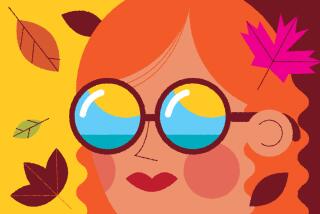Why fall pollen allergy season knows few bounds in California

- Share via
Fall is in the air and so, alas, are zillions of grains of weed pollen, sailing hither and yon, high and low, far and wide. These guarantee an abundance of new little weeds next year — and an abundance of sniffy, sneezy, wheezy people right now, namely those unfortunate souls who have an allergy to pollen.
Pollen allergy is often called “hay fever,” although it doesn’t cause fever and its only connection with hay is that it inflicts its woes at hay-harvesting time. The name “seasonal allergic rhinitis” — where “rhinitis” refers to an inflamed nose — is more accurate if less evocative.
What exactly is an allergy?
We all rely on our immune systems to protect us from harmful stuff that sneaks into our bodies. But if your immune system is a tad overzealous and reacts to a particular substance as though it’s a threat even though it’s really not, then you have an allergy. For instance, most people can breathe in pollen and never know it. But if you have an allergy to pollen and you breathe some in, your immune system will mistake it for an enemy and send antibodies to fight it. The antibodies will rally a chemical called histamine, and in the ensuing confrontation, the capillaries in your eyes and nose will become dilated and leaky, and your tissues will get soggy. “Like a sponge dropped in a bucket of water,” says Dr. Jordan Pritikin, director of the Chicago Nasal and Sinus Center. In short, you’ll wind up with a runny or blocked-up nose, red, watery, itchy eyes, and no end of misery.
Why do people have allergies?
“There’s a genetic component,” says Dr. Melinda Braskett, medical director of the UCLA Food and Drug Allergy Care Center. Braskett also cites the “hygiene hypothesis,” which says that vaccines, antibiotics and a generally germ-free lifestyle may also contribute to a current surge in allergies. Because we’re exposed to relatively few genuine troublemakers, our immune systems may not learn to discriminate between them and innocuous substances. Although this is still called the “hygiene hypothesis,” it’s now supported by so much evidence that it’s widely accepted as true, Braskett says.
How common are pollen allergies?
It’s estimated that about 20% of Americans are allergic to pollen.
How can you tell if you have an allergy or a cold? A cold will give you a fever, but it won’t make your eyes, nose and throat itch. The opposite holds for an allergy. And a cold has one big plus: It should go away within two weeks, while an allergy is not so kind.
Why are pollen allergies so obstreperous right now?
Every day of the year, some plants somewhere are pollinating and giving grief to some people. But in this country, weeds pollinate in the fall, and weeds are huge allergy agitators. And be warned: California’s relatively mild winters mean the pollination season can go on ... and on ... and on. Not only that, but because of warmer temperatures and higher concentrations of carbon dioxide associated with climate change, weeds everywhere are producing more pollen than ever, Pritikin says.
Are there other allergies that act up in the fall?
Allergies to mold and dust mites can also be especially problematic in the fall, although in Southern California, Braskett says, major mold troubles generally occur close to the ocean — and there they can occur year round. Pet and food allergies are also year-round. In fact, many people who are allergic to pollen have so-called pollen-food allergy syndrome, or oral allergy syndrome. Some fresh fruits and vegetables and even some nuts and spices can make their mouths tingle or itch.
Are pollen allergies life-threatening?
In severe cases, the pollen-food allergy syndrome can cause swelling of the throat or even anaphylactic shock. But by themselves, pollen allergies do not cause these extreme reactions, Braskett says, because pollen generally gets trapped in your nose and airways and doesn’t get into your blood stream. Still, allergic reactions can be a real concern for people who also have asthma, she warns.
Can you prevent an allergic reaction to pollen?
The one sure way to prevent an allergic reaction is to avoid whatever you’re allergic to. “But if you’re allergic to pollen, that’s a challenge,” Braskett says. Here’s why: To fill its role in the reproductive cycle, pollen has to travel from one plant to another of the same ilk. The pollen from weeds (and from trees and grasses) gets carried around by the wind. Some of it lands on simpatico weeds and the reproductive cycle continues. But the random nature of the wind transport system means that a lot of the pollen lands in people’s noses. By contrast, the pollen from showy, flowering plants gets carried around by insects. So the only place you’re likely to come into contact with it is on the plants themselves. Consequently, if you’re allergic to rose pollen, you’ll be fine as long as you don’t stop and smell the roses. This tip is not terribly helpful though, because very few people are allergic to rose pollen.
ALSO:
Dieter, beware: Weight-loss fads can be bad for your health
Fitbit Flex Wireless Activity and Sleep Wristband spurs you on
Lying about your age in L.A. is more common than you may think






